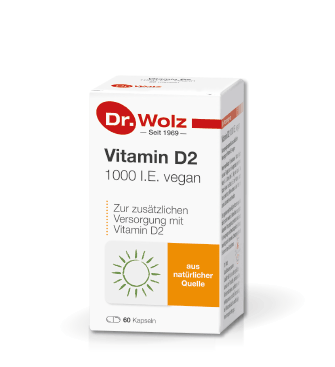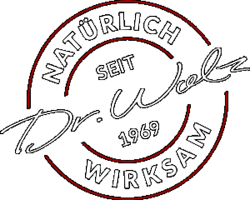Vitamin D2 1000 I.E. vegan
For the immune system1
For normal muscle function2
For healthy bones in adults and children3, 4

Package size: 60 capsules
One capsule daily is sufficient to cover the daily requirement of vitamin D.
Gluten-free, free from lactose, gelantine and colorants.
Vitamin D is a versatile vitamin, which is primarly used to support bone health. As recent studies show vitamin D supports many functions in the human body.
Furthermore, vitamin D is important for muscles, teeth and the immune system. Especially during the dark season it is important to supplement vitamin D. Dr. Wolz offers high-dosed vitamin C that supports growth and bone development in children. It is suitable for the whole family. To provide a reliable supply of vitamin D year-round Dr. Wolz offers you a high-dosage, vegan vitamin-D-preparation extracted from plant-based yeast. Vitamin D does not only support bone health in adults, it also supports growth and bone development in children.
How much vitamin D does a healthy person need ?
Normally, the vitamin D level should be in between 30 and 50 μg/l.
Individuals that frequently have a vitamin D deficiency:
- Children + young people
- Immobile people
- The elderly
- Pregnant + breast-feeding women
- Menopausal women
- Athletes

Package size: 60 capsules
One capsule daily is sufficient to cover the daily requirement of vitamin D.
Gluten-free, free from lactose, gelantine and colorants.
What do humans need vitamin D for?
Vitamin D is of great importance for the human body because many physical functions depend on a good vitamin D level. Certain metabolic processes also require vitamin D5. Vitamin D is important for children to support growth and healthy bone development, as well as for older people. Vitamin D supports your immune system therefore, anyone with an increased need such as pregnant women, breast-feeding women, women in menopause and atheltes should supplement vitamin D.
Adequate intake of vitamin D
Our body is able to produce vitamin D with the help of the sun (UVB rays), which is why vitamin D is also called the "sun-vitamin". Through food, vitamin D can mainly be absorbed by eating fish. Dairy products contain small amounts of vitamin D. Vitamin D is converted into its active form in our liver and kidneys.
Due to many reasons, it can be really difficult to maintain a high level of vitamin D in the blood. In the dark season the sun light is often too weak to produce enough vitamin D in the skin. Even in summer, skin of old people can no longer produce as much vitamin D as the skin of young people. In addition to that, many people have a lack of vitamin D unbalanced or unhealthy diet – most people consume too little vitamin D-rich foods such as fish or cheese. Vitamin D2 1000 I.E. vegan is a high-dosage vitamin-D.preparation from Dr. Wolz that contains as much vitamin D as you could ingest with consuming 150g salmon or 100g hering daily.
How does the vitamin-D-metabolism work?
Our body either absorbs vitamin D (colecalciferol) oder vitamin D2 (ergocalciferol) through sunlight or foods. In the liver, they are both converted into their stored form (serum = 25(OH)D3). Vitamin D levels can be measured by means of blood work. Vitamin D is converted into the active hormone (Calcitrol = 1,25 (OH)2 D3) in the kidney.
Vitamin D2 from yeast
In comparison to vitamin D3, the vitamin D2 being used in Dr. Wolz products consists of yeast. Ergocalciferol (vitamin D2) is the substance that forms the foundation. It is gained from ergosterol that can also be found in e.g. the cell membrane of mushrooms. Ergosterol is a natural substance and belongs to the sterines.
Active ingredients
One capsule contains Vitamin D2 (1000 I.E.) 25 µg, vitamin C from the acerola cherry 48 mg. Vitamin D2 1000 I.E. ist vegan. The capsule shells are made of plant-based cellulose.
1 Vitamin D contributes to normal functioning of the immune system.
2 Vitamin D has a function in cell division.
3 Vitamin D contributes to maintaining normal bones and teeth.
4 Vitamin D contributes to the maintenance of normal muscle function.
5 Vitamin D contributes to normal calcium levels in the blood.

